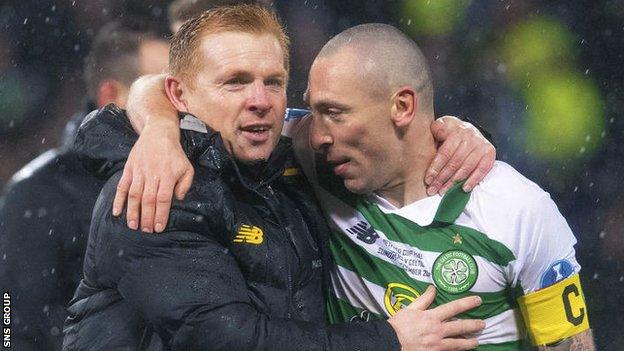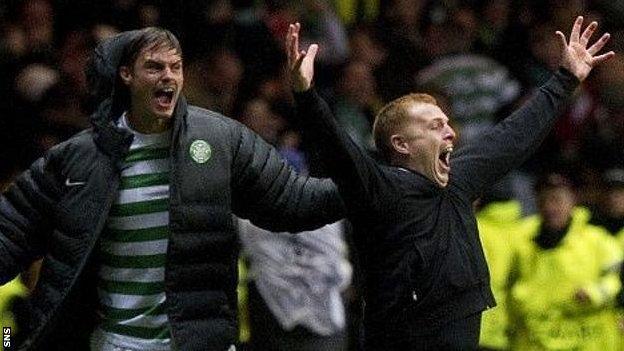Neil Lennon: 'Football will mean a lot more to a lot of people when it returns'

Last updated on .From the section Celtic

Like so many, Neil Lennon took a minute to applaud the NHS workers on Thursday evening, standing at the window of his Glasgow flat and clapping appreciatively as others around him clapped and banged their pots and pans in acknowledgment of these incredible people.
He found it emotional and he wouldn't have been alone in that either. "The word I keep hearing on the news, from leaders of countries and leaders of sports associations, is unprecedented," he says. "It's the word of the year. Everybody is saying it and they're right. Look, I don't want to be getting up on my high horse and preaching to anybody but we might look back on this as a time when our society changed.
"I'm really missing football, I'm missing the players, the staff, the games, the colour, the noise, but it's no bad thing to take a moment and appreciate what you've got.
"I think football will mean a lot more to a lot of people when it returns. What I'm seeing now is us going back to our roots, going back to community life with people looking out for each other and maybe we'd gone away from that. What's happening is tragic but everybody is pulling together to try to get through it and that's brilliant."
Caged animals & mental health
Lennon is communicating with his players from a safe distance. It could be five months, and possibly longer, before they're back out there and he knows how they're feeling right now. "They're like caged animals," he says. "These are young, fit men who're used to an almost regimented way of living. Their routine is training and playing. All of that is gone. Some of them will be cooking for themselves for the first time in their lives.
"Mentally, the change can put a strain on them. They're used to intensity and suddenly it's not there. We're very aware of the mental [health] side of this. We all need to keep our well-being in order. As long as I can get out and get some exercise for my own peace of mind then I'm fine. The silence is deafening when you go out for a walk. The place is deserted. We just have to ride it out as best we can. We're all in the same boat."
This past week has marked 10 years since Lennon became a manager. He was only 38. "I'm a year off 50," he says. "All of a sudden, it creeps up on you. Where has it all gone? There's been a lot crammed in and you never really get much time to take stock."
Now is as good a time as any. What else would we be doing? Lennon in Scotland is an epic tale that would take an awful lot of telling with more time and space required than we have here. He's a Netflix series unto himself.
There's the football, the trophies, the cut and thrust of his professional life and there's the poison. He's had a death threat from the Loyalist Volunteer Force, he's been knocked unconscious in the street, he's had a guy try to run him off the road, he's been spat at and head-butted, he's had bullets in the post, he's had a viable parcel bomb intercepted, a person has done time for a threatening him in a social media post, another person has depicted him in a mock hanging on the internet, somebody else daubed a message on the wall outside Tynecastle saying that he should be killed.
We could go on and on. The rampant bigotry he has been subjected to, the attack by a fan at Tynecastle - "that guy lacked social skills" he says, in a magnificent and intended understatement.
It's hard to remember them all, unless they'd all been done to you, in which case it would be hard to forget. Without question he's the most disgracefully treated person there's ever been in Scottish football.
'I had a great upbringing'
But he's made of tough stuff. "I had a great upbringing," he explains. "My parents kept us out of trouble. We didn't have much to live on but they did their best and as you get older you appreciate more and more what your parents did for you.
"Growing up in the 1970s in Northern Ireland wasn't easy. The most vivid memories were of the year of the Hunger Strikes, the rioting and the tension. I was about 10 or 11. That was a really intense period, especially in the nationalist, republican community where I grew up. I saw some stuff. The plastic bullets. I used to see them lying on the street, six inch cylinders, heavy and hard things, but my parents kept me away from it."
There's a story about the younger Lennon that tells you something about the steel in him. He was playing for Crewe when he broke his back, 16 metal staples being inserted to hold things together. There were doubts about whether he would ever play again but there were also doubts if he would ever walk again if things went wrong. He was 19-years-old, was earning £120 a week and was out for year.
From that to this, it's quite a journey. We're talking on the phone because that's how things are done in these strange times but even without the face to face his humour and intelligence shines through.
Ten years since he became a manager. What would he tell the Neil Lennon of 2010 if he was sitting in front of him right now? "I'd tell him that I admire his passion and his drive, but that he can't do it all by himself," he answers. "What I've learned is how to adapt to players rather than trying to get them to adapt to me. I'm far more rounded now than I was then. You just learn, don't you?"
Snapshots from his football life. One of the scariest moments came in October 2011, a day when it could have ended even before it really got started. Celtic trailed Rangers by 10 points at the top of the league and found themselves 3-0 down at half-time at Rugby Park. "That was a pivotal moment," he recalls. "It's a bit of a walk down to the tunnel and I was looking at our fans and I said to myself, 'I'm not giving this up just yet'. The reality was that if we continued in the same vein I was going to get sacked. My personal pride and the pride I have in the club was hurting, so I got after the players a wee bit.
"I gave them an ultimatum, basically. I went in and said, 'Look lads, see if you want me here on Monday, you have to turn this around because we're embarrassing the club and the fans out there'. They got the draw and then won 17 games in a row and we won the league and we won it back at Kilmarnock, 6-0 on a gloriously sunny day."
'A golden moment' against Barcelona

His greatest moment was beating Barcelona in the Champions League in 2012 and making the last 16 of the most illustrious club competition in the world.
"I'm standing on the touchline that night and I'm a few feet away from Messi and Iniesta and Xavi - some of the best players who ever played the game," he recalls. "I'm thinking this is what it must be like if you walked up the 18th fairway with Tiger Woods on the Sunday at the Masters or you were ringside watching Muhammad Ali. Proper legends - and here was my team beating these incredible players."
Does he remember who Barca brought on that evening? "David Villa was one of them... Who else?" Gerard Pique and Cesc Fabregas.
"And we brought on Tony Watt!," he says. "We brought him on for (Mikael) Lustig and Adam Matthews went from left-back to right-back, Charlie Mulgrew went from left-wing to left-back, Georgios Samaras went from centre forward to wide left and we put Tony up there and told him to do what he could. It was the kid's golden moment - and a golden moment in my life."
He cites his brief spell at Bolton as his biggest low in management. The club went into administration, they started selling off assets, the chairman Phil Gartside passed away and every day was stressful, a world away from what he had left behind at Celtic Park when he exited in 2014.
"It was a bad experience, but one you learn from," he says. "You're used to winning up here. You never take it for granted, but your weekends are normally quite good. Bolton was the total opposite.
"Football management is lonely at times. Everything stops with you. You have to strike a balance, you can't let it dominate your life. If it's 24/7 and you're winning then everything is brilliant, but when it's 24/7 and things are going wrong you have to have a valve you can turn off.
"You have to find other things to do even though at times it's virtually impossible. I always remember Fergie [Sir Alex Ferguson] telling me that when Roger Federer lost a final he would take his family out to dinner and they weren't allowed to talk about tennis. That's a good one.
"You analyse a game to death but you can't get it back. Deal with it on the day and move on. Fergie had the horses as a distraction. I like to read. It can't always be work, work, work or it will grind you down eventually."
Van Dijk, Edouard and his captain
He says Virgil van Dijk has been his best signing and that Odsonne Edouard is as good as anything he's seen up front for Celtic since Henrik Larsson. The most significant player on his watch has been Scott Brown.
"He's an outstanding captain and an outstanding footballer and that gets overlooked sometimes," he says. "He still covers the ground well even at at 34, which I didn't do at 34. He still has that great cardiovascular capacity. People try to take him on all the time but he's got the dark arts you need to have in the throes of a game. He sets standards every single day."
There's not much opportunity to do that now. Everything is on hold. Lennon wants the Premiership played to a natural finish - Celtic are 13 points ahead at the top - but the mood music tells us that this league could be called pretty soon. The financial imperatives may demand it.
"We want to play all the games but I don't know if that's possible," he says. "It's not the main concern. We'll do what we can do, but the most important thing is that all everybody stays safe and well in these scary times. That's the thing that matters."












